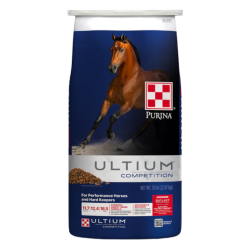Lysine (min) . . . . . . . . . . . . . . 0.70%
Crude Fat (min) . . . . . . . . . . . 12.40%
Crude Fiber (max) . . . . . . . . . 18.50%
Sugars (max) . . . . . . . . . . . . . . 6.00%
Starch (max) . . . . . . . . . . . . . 10.00%
Calcium (Ca) (min) . . . . . . . . . 0.85%
Calcium (Ca) (max) . . . . . . . . . 1.35%
Phosphorus (P) (min) . . . . . . . 0.50%
Sodium (Na) (min) . . . . . . . . . . 0.20%
Sodium (Na) (max) ........... 0.70%
Copper (Cu) (min) . . . . . . . 65.00 ppm
Selenium (Se) (min) . . . . . . 0.50 ppm
Zinc (Zn) (min) . . . . . . . . 240.00 ppm
Vitamin A (min) . . . . . . 5000.00 IU/lb
Vitamin E (min) . . . . . . . 150.00 IU/lb
Feeding directions with hay or pasture.
Start with the amounts given for the weight and lifestyle of the horse. After observing the horse for a period of time, the amount fed may be increased or decreased by 10% to obtain the desired body condition and weight.
| | | Weight of Horse in Pounds | |||||||
| Lifestyle | 800 | 900 | 1,000 | 1,100 | 1,200 | 1,300 | 1,400 | 1,500 |
| Moderate Work (pounds of feed per day) | 5.00 | 5.50 | 6.00 | 6.5 | 7.25 | 8.0 | 8.5 | 9.25 |
| Heavy Work (pounds of feed per day) | 6.25 | 7.0 | 7.75 | 8.5 | 9.25 | 10 | 10.75 | 11.5 |
| Very Heavy Work (pounds of feed per day) | 9.25 | 10.25 | 11.5 | 12.5 | 13.75 | 15 | 16 | 17.25 |
Best Results
- Feeding rates will vary with size, age, temperament, health status, forage quality,climate and activity level. Feed at regular times - at least twice daily - with three daily feedings preferred. Let horses feed in a natural position from troughs with large bottoms, placed at normal head height or lower. Do not feed free-choice. Prevent the rapid eating by the horse of any feedstuff.
- Reduce and/or delay feeding a horse which is hot, excited or showing pain, has fever or diarrhea. Consult your veterinarian if any problems arise.
- Always feed a minimum of 1.0 to 1.2 lbs per 100 lbs of body weight of good quality,clean hay or the equivalent in pasture.
- Any feed changes should be made gradually over a period of 7 to 10 days. Changes in the rate of feeding should not exceed 1.0 lb per day for each horse.
- Have plenty of clean, fresh water available at all times. Provide your horse with access to salt. Maintain an effective control program for internal parasites. Have the horse's teeth examined annually and consult your veterinarian on a regular basis.
Changing To
- Make the feed change gradually over a period of 7 to 10 days.
- Mix the new feed with the old, gradually increasing the amount of the new feed while decreasing an equal amount of the old.
- Changes in the rate of feeding should not exceed 1 pound per day for each horse.
Caution
Purina Ultium Competition Horse Formula is highly researched nutrition for the high energy demands of hard-working equine athletes. This senior equine feed allows them to compete at their highest levels by helping to support their nutritional needs. When others hit the wall, your horse keeps going. Unique “pellets and extruded Amplify nuggets” aim to prevent sorting, reduce waste and transport easily. Highly palatable and digestible, it’s “nutrient dense,” and “highly efficient” so you can “feed less.”
Sustained Energy System features a unique blend of three (3) fuel sources:
1. Fat
2. Fermentable Fiber
3. Soluble carbohydrates (starch and sugar)
Stop in and shop at New Braunfels Feed & Supply in Texas. Have questions? Our helpful staff is here to assist you in finding the right feed and supplies.
Purina Ultium Competition Horse Formula
- Brand: Purina Animal Nutrition
- Product Code:8176
- Weight:50.00lb
- UPC:804273072142
Explore More For: Performance Horse
